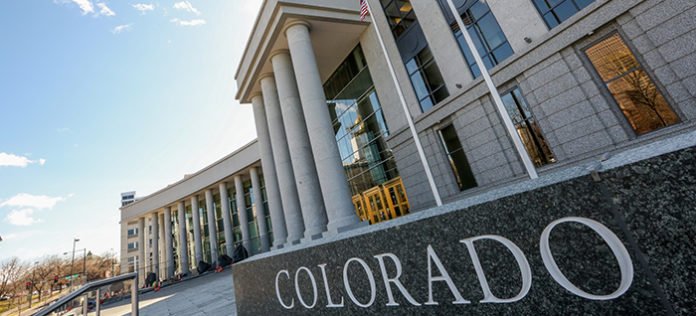
Editor’s Note: Law Week Colorado edits court opinion summaries for style and, when necessary, length.
Colorado Court of Appeals Opinions, June 10, 2021
The Colorado Court of Appeals was asked if a lower court abused its discretion by not defining “universal malice” to a jury in an extreme indifference murder trial.
Cristobal Garcia was convicted of attempted first-degree extreme indifference murder after firing three shots in the direction of his girlfriend, Natalie Duran, and her sister, in response to a verbal argument. Neither sister was harmed, but Garcia was charged with three counts of murder under theory of intent of deliberation and theory of extreme indifference. A jury acquitted Garcia of two counts — convicting him instead with a lower charge of reckless endangerment — and convicted him on one count of attempted first-degree murder with extreme indifference.
During the trial, the court instructed the jury on six elements of extreme indifference murder. However, rejecting additional instructions offered by Garcia’s defense, the court did not define “universal malice,” a necessary element of extreme indifference murder.
Garcia appealed the jury’s conviction, arguing that the trial court abused its discretion by not allowing the additional instruction, and that during voir dire for prospective jurors, the trial court’s explanation of reasonable doubt lowered the prosecution’s burden of proof.
Since “universal malice” is not defined in any state statutes or Model Jury Instructions, the Court of Appeals used previous court cases to define it as the “willingness to take a life indiscriminately.” Although this specific definition was not given to jurors, the court held that the other instructions given to the jury were accurate and adequate. And since no jurors expressed confusion about the term “universal malice,” the court did not abuse its discretion.
Although they affirmed the decision, Judge Terry specially concurred with the other justices, agreeing with the result reached, but cautioning lower courts against lowering the reasonable doubt standard by using analogies. Specifically, Terry took issue with comparisons between reasonable doubt and driving given at voir dire for potential jurors. “Because analogies that compare reasonable doubt to everyday decisions tend to oversimplify the concept of reasonable doubt, such analogies should not be imparted to jurors or potential jurors,” Judge Terry wrote.
People in the Interest of J.R.
In reviewing a juvenile court case, the Colorado Court of Appeals found the admission of expert testimony usurped the jury’s role as fact finder, but that the error did not cast serious doubt on the trial verdict.
J.R. was adjudicated delinquent by a jury after two children, A.M. and E.P, alleged sexual assault over the course of multiple years. J.R. was 13 when the alleged abuse began in 2011 and both victims were eight. After forensic interviews with both victims, the prosecution filed a petition for delinquency charging J.R. with multiple counts of sexual assault on a child and indecent exposure.
At trial, Dr. Katherine Snyder, a pediatrician who specializes in child sexual assault, testified to the jury that she diagnosed E.P. with sexual abuse. Dr. Snyder’s examination of E.P. included “basic questions” about the allegations; a physical exam that found no signs of trauma; and a test that found E.P. had bacterial vaginosis indicating sexual intercourse, but not necessarily sexual assault. As Dr. Snyder testified to the jury, she diagnosed J.R. with sexual abuse based on current diagnostic criteria: “when you have a child or even a teenager who is giving you clear, detailed information and it’s consistent over repeated tellings, that is very consistent with a diagnosis and that’s all you need to diagnose sexual abuse.”
J.R. appealed the jury’s decision, arguing that by allowing Dr. Snyder’s testimony, the court bolstered the victim’s testimony and usurped the jury’s role as fact finder. The court agreed with his appeal, finding that although the admission of Dr. Snyder’s testimony was erroneous, it was not a plain error that could cast doubt on the jury decision. Ultimately, the jury’s decision was affirmed.
Colorado Judicial Department v. Colorado Judicial Department Personnel Board of Review
The Court of Appeals weighed in on whether or not district courts can review decisions made by the Judicial Department Personnel Board of Review under Colorado Rules of Civil Procedure 106(a)(4).
The court found that Colorado Judicial System Personnel Rules bar these challenges and that allowing a district court to review such decisions would interfere with the supreme court’s authority to regulate personnel as outlined in the state constitution.
Probation officer Abbey Dickerson was fired from the Eighteenth Judicial District for violating department confidentiality and social media policies. Dickerson appealed her termination to the Judicial Department Personnel Board of Review. The hearing officer appointed to her case found that while Dickerson did violate policies, her termination was arbitrary and capricious, and recommended an unpaid, 90-day suspension. The Judicial Board of Review affirmed the officer’s decision on appeal.
After exhausting its options within the personnel department, the Eighteenth Judicial District filed a complaint against the board of review to the Denver District Court arguing the board abused its discretion under 106(a)(4). Both Dickerson and the board of review motion to dismiss the complaint, arguing that the application and interpretation of judicial department personnel rules are only in the jurisdiction of the state supreme court; based on 106 the board is neither a “governmental body” nor a “lower judicial body;” and by allowing the complaint, one trial court would be reviewing the decisions of another trial court on the same level.
The case did not challenge the board’s decision about Dickerson’s termination, but instead focused entirely on jurisdiction.
Based on state Personnel Rules, the Court of Appeals determined that decisions by the Judicial Department Personnel Board of Review cannot be challenged in trial court. The court points out that the language in the Personnel Rules allows for decisions to be appealed, but also notes that after a case goes in front of the Judicial Board of Review it is final.

